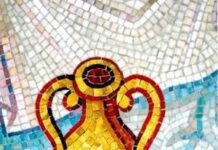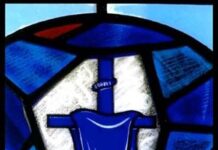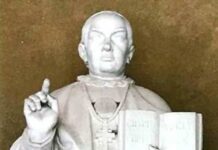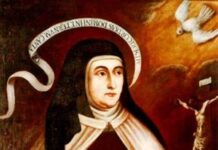You are not signed in as a Premium user; we rely on Premium users to support our news reporting.
Sign in or Sign up today!
Saint Bonaventure is hailed as one of the greatest theologians in Church history. He’s also called the second founder of the Franciscans because he healed division between the order’s members — keeping St. Francis’ spirituality alive.
_-_Saint_Bonaventure.jpg)
Born to a physician in 1221 in Bagnoregio, Italy, Bonaventure was given the name Giovanni. When he was 4 years old, he became sick and was at death’s door. His mother, sad and desperate, sought out St. Francis of Assisi to cure him.
The holy saint came over immediately, and little Giovanni was cured. When that happened, St. Francis declared, “O bona ventura” — a Latin phrase that means “Oh! good things to come!”
But even in Francis’ own brief lifetime, disputes began among some of his friars. They fought over how strictly the order should live out Francis’ interpretation of poverty.
Saint Francis didn’t even want his friars to touch money, never mind spend it. But the early days of scruffy friars preaching in town squares was quickly coming to an end. The order now had thousands of members across Europe and some of them also had vocations to the priesthood. It was a change from St. Francis’ original vision of the order. Nearly 18 years after St. Francis died, the order struggled to reconcile the spirit of poverty he embraced with the practical realities of the world.
Giovanni graduated from the prestigious University of Paris with a master of arts degree and joined the Franciscans. He took the name Bonaventure and continued his studies, in a short time earning a doctorate in theology. In addition to praising his sharp intellect and excellent memory, Bonaventure’s contemporaries remarked on his virtue and holiness.
He taught theology and headed the Franciscan school in Paris for a few years, writing many notable theological works. He is also renowned for writing a biography of St. Francis of Assisi.
At the University of Paris, Bonaventure became good friends with St. Thomas Aquinas. A pious legend from the time claims that one time Thomas came to visit Bonaventure. Thomas found him in ecstasy while writing The Life of St. Francis of Assisi. Saint Thomas left Bonaventure’s chamber remarking, “Let us leave a saint to work for a saint.”
Bonaventure and others at the University of Paris had to defend the mendicant lifestyle of the Franciscans, Carmelites and Dominicans. At that time, the religious vocation was misunderstood by many people — especially diocesan priests.

Both Bonaventure and Aquinas wrote treatises defending the existence and practices of mendicant orders and their role in the Church.
Due in large part to his ardent defense of the Franciscan order, Bonaventure went on to become the minister general of the Friars Minor in 1257, at the age of 35.
It is due to his 18 years as minister general that he became known as the “second founder” of the Franciscans. He established a faithful and reasonable set of disciplines for the Friars Minor regarding how to live out the Franciscan charism in a growing and changing order.
Later on, Pope Gregory X forced him under obedience to be consecrated as a bishop and appointed him a cardinal. The story goes that when his red hat was sent to him, he told the friars to hang it on a tree branch for him until he finished washing the dishes.
One of the big things St. Bonaventure did that would impact the whole Church, is that he required Franciscan friaries to ring the Angelus bells. It was in that way, the practice of praying the Angelus at 6 a.m. and 6 p.m. every day was spread throughout the Catholic Church in the West.
Both Bonaventure and Aquinas wrote treatises defending the existence and practices of mendicant orders and their role in the Church.
In 1274, Bonaventure resigned as vicar general of the Franciscans; he died July 15 of that year. In the Franciscan spirit, his intellectual life drew from his heart’s burning love of God. For this reason, he received the appellation “the Seraphic Doctor.”
Learn more by watching The Download — Soul Doctors.
— Campaign 27425 —
Have a news tip? Submit news to our tip line.

We rely on you to support our news reporting. Please donate today.






















